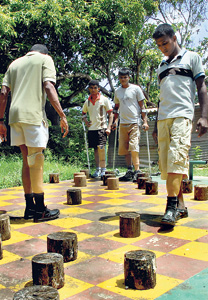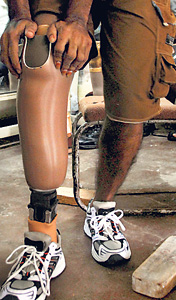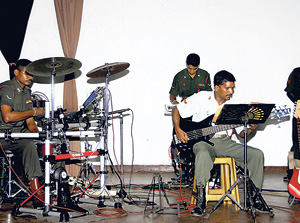Pyjama-clad, on crutches, others on wheelchairs and still others in groups playing carrom or draughts or just chatting – all of them injured soldiers in various stages of rehabilitation. Despite their injuries there is an air of relaxed camaraderie at Ranaviru Sevana, the spacious main rehabilitation centre of the Sri Lanka Army at Ragama, where battle scarred soldiers are cared for and rehabilitated.
 |
Staff officer
J.R. Ampemohotti |
A dedicated team of 12 officers and 300 staff members render invaluable service to their injured comrades, helping them to come to terms with and overcome their disabilities and begin their lives again. In fact, about 80% of the officers and staff are themselves disabled by the war, which is a positive example and encouragement to the more recent arrivals, still recovering from the trauma.
“We are trying to improve the infrastructure. We would like to expand the vocational training section and also have aesthetic training in different fields. We need the help of civilian resource personnel to take this forward. Our vision is by 2020 to empty Ranaviru Sevana and have all patients rehabilitated and sent to regiments or to their homes,” says Commanding Officer of Ranaviru Sevana Col. Dr. Thamara Wickramasekara.
Col, J.R. Ampemohotti, Staff Officer, Directorate of Rehabilitation says many programmes and projects are being implemented. There are three stages of rehabilitation. In the first stage of Medical Rehabilitation, the patients are given hospital care and thereafter, long term rehabilitation at Ranaviru Sevana as necessary.
Then comes Social Rehabilitation, where they are integrated into society. When the medical treatment is completed, they are sent to their regiments for regimental-based rehabilitation. Their needs are looked after by the regiment. They are mostly amputees and those with minor injuries. However, facilities are also provided for the blind and those with paralysis.
The final stage is Community Based Rehabilitation with experts to see to their needs. “Once they are settled in the community, we visit them regularly,” Col. Ampemohotti said. “Those who do not have proper facilities in their homes are helped by the Welfare Department.
We also provide them with their requirements of artificial limbs, wheelchairs, crutches and surgical devices.”“We have a system of sending them home or to the regiments after rehabilitation,” said Col. Wickramasekara, explaining that as many of the injured soldiers are young and have recently joined the army, courses are conducted for them at the regiment so that they gain some knowledge about the army. Col. Wickramasekara said those who go out are trained in IT and at least one vocational subject, so that they are kept occupied. “Even if they cannot fight in the army they can contribute to our economic war in some other way,” she said.
 |
| Testing their skills on the giant outdoor draughts board. |
A gymnasium equipped with facilities for a variety of disabled sports is also available for those undergoing rehabilitation. “Disabled sports originated in the army,” the Commanding Officer said. One of their staff members who is himself blind, Major D. Yapa conducts training in Blind Archery. He goes abroad for competitions and has won many prizes. Major Karavitage, another soldier amputee who took up archery after his injury is an International Archery Judge.
At Ranaviru Sevana, the CO said, they provide the soldiers initially with medical facilities and hospital care, then fitting of prostheses for those who need it, and training in usage, physiotherapy, occupational therapy, speech and language therapy, hydro therapy, training in mobility and activities for daily living. The hydrotherapy pool with heated water is the only such pool in the country, she added.
Finally they are given vocational training to help them in job placement should they wish to leave the army. Since many of the soldiers who come in are young, they often do not know what they want to do or what their talents are, a detailed questionnaire is given to them to fill so that their requirements could be assessed. “We encourage all our inmates to undergo computer training,” she says.
At the IT Lab in the Special Education Section, two blind soldiers were at the computer training. Major H.K.M.G. Asela said they have special software with speech output for the blind. Other soldiers too are being trained in IT. In this section facilities are available for training in mobility and living skills for the blind, speech and language therapy for those with communication disabilities, relaxation therapy and counselling designed to help them achieve a better quality of life. Major Asela whose left leg was amputated after he was injured at Elephant Pass, was himself rehabilitated at Ranaviru Sevana. He followed a two-year full time training course on Speech Therapy and now conducts courses for the others.
The section has a recording room where books are recorded into CDs. Students from outside are encouraged to come in and help them record for the CD library. However, they are in need of more computers for this task.
In the Department of Occupational Therapy, the focus is on training in fine movements and daily activities, says Occupational Therapist, WO I. Wimaladasa. Here there are paraplegics, hemiplegics, tetraplegics and those with head injuries being helped to coordinate their fine movements using equipment, to improve their daily activities.
The Department of Vocational Training has equipment for conducting training courses in leatherwork, coir work, pottery painting, book binding, screen printing and wood carving. Courses are also conducted on TV, A/C and refrigerator repairing, aqua culture, landscaping, horticulture. “We need to improve this section to include new fields,’ says Captain Noyel Rajapakse who was injured at Omanthai in 2007.
“There isn’t sufficient space to conduct all these courses.” After their prostheses are fitted, the amputees can go to their regiments and participate in various projects or do clerical work and office administration, Capt. Rajapakse said.
About 200 soldiers have been trained in government institutions in fields like motor mechanics, plumbing, carpentry and computer programming.
The Ranaviru Band comprises musically-talented soldiers. Major Lakshman. Karavitage, Second in Command at Ranaviru Sevana, said some of them discovered their musical talent at Ranaviru Sevana.
The band plays for army functions and outside events and have played in New Zealand, UK, Australia and Italy.
To walk tall again
Currently they have registered soldiers requiring 560 prostheses above knee, 4,254 below knee, 102 above elbow and 182 below elbow and 2460 surgical shoes.
Brigadier Warusavithana, Director Rehabilitation said when the medical rehabilitation process is over they have to concentrate on vocational training. Soldiers are sent to Vocational Training Authority, Lakviru Sevana and such institutions for training in various fields. She said after the current influx from the recent battles, they do not expect to have large numbers of patients for rehabilitation. “However, whatever the numbers we will cope,” asserted the Brigadier.
Currently they have registered soldiers requiring 560 prostheses above knee, 4,254 below knee, 102 above elbow and 182 below elbow and 2460 surgical shoes.
Brigadier Warusavithana, Director Rehabilitation said when the medical rehabilitation process is over they have to concentrate on vocational training. Soldiers are sent to the Vocational Training Authority, Lakviru Sevana and such institutions for training in various fields. She said after the current influx from the recent battles, they do not expect .
|




